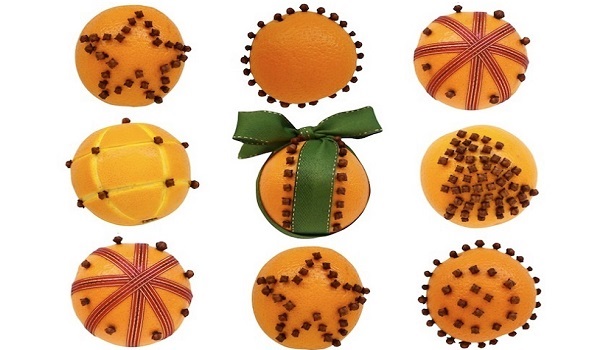Main Name: Clove
Biological Name: Syzygium aromaticum
Names in other languages: Diente (Spanish), Gousse (French), Laung, Lavang (Hindi), Lavangam, Krambu (Tamil), Kariampo (Malayalam), Lavangalu (Telugu), Laving (Gujarati), Lobongo (Bengali), Lavang (Marathi & Punjabi), Labanga (Oriya), Lehsan Ki Pothi, Long (Urdu)
Biological Name: Syzygium aromaticum
Names in other languages: Diente (Spanish), Gousse (French), Laung, Lavang (Hindi), Lavangam, Krambu (Tamil), Kariampo (Malayalam), Lavangalu (Telugu), Laving (Gujarati), Lobongo (Bengali), Lavang (Marathi & Punjabi), Labanga (Oriya), Lehsan Ki Pothi, Long (Urdu)
Of all the spices that are known to be good sources of antioxidants, cloves rank as the richest source of antioxidants. With the primary job of cloves being protecting the cells against oxidative stress free from radical damage, cloves have a long list of healthful benefits. Indigenous to the Moluccas volcanic islands of Indonesia, previously known as the Spice Islands, clove is a pink flower bud of the clove tree that turns brown on drying. Botanically known as Syzygium aromaticum, the word clove has been derived from the Latin word clavus, which means nail. Measuring about ½ inch long and ¼ inch in diameter, cloves have a tapered stem, which resembles a tiny nail. The warm, sweet, and aromatic taste is used to flavor several sweet and spicy dishes. So whether it is pies, breads, cakes, tarts, jams, soups or your favorite starter, cloves add the right amount of zing to enhance the overall flavor of the delicacy. While the exterior of the spice is hard and tough, it is the fleshy interior that contributes to the flavor and nutritional profile. The oily compound, called eugenol, present in cloves makes it vital for a number of medicinal and nutritional properties. Let’s find out what health benefits cloves provide apart from the lovely aroma they add to breads, pies, soups, and spicy preparations.
History
The history of cloves dates back to many centuries, just like other spices. Believed to be one of the first spices to be traded, evidence of cloves has been found in vessels dating back to as early as 1721 BC. Originally from Moluccas Islands in Indonesia and southern Philippines, cloves were a prized commodity by the ancient Romans. Not just Romans, even the Chinese treasured them and used them in around 226 BC. The flowerets were chewed by the people before addressing the Emperor so that their breath did not produce a foul smell. The Arabs brought cloves to Europe in the 4th century, but were not widely consumed and were regarded as the poor man’s spice for enhancing the poorly tasting food. Only when Magellan’s ship returned from its fateful trip round the world in 1522 filled with cloves and nutmeg, did Spain get a chance to explore the island. The Portuguese took over the Indian Ocean trade, with a treaty signed with Spain and brought large amounts of cloves to Europe, only to sell them at expensive prices. In 1605, the Dutch traveled to the island and dipped their hand into the spice trade. Though the Dutch wished to establish monopoly of cloves, it did not last long since cloves starting growing in other places too, like Zanzibar, Madagascar, Brazil, Mauritius, Ternate, Tidore and Tanzania by the 18th century. Today, Zanzibar, in Eastern Africa, is the leading producer of cloves, though they are commercially cultivated in West Indies, Brazil, Pemba, Sri Lanka, Jamaica, Madagascar and India also.
The history of cloves dates back to many centuries, just like other spices. Believed to be one of the first spices to be traded, evidence of cloves has been found in vessels dating back to as early as 1721 BC. Originally from Moluccas Islands in Indonesia and southern Philippines, cloves were a prized commodity by the ancient Romans. Not just Romans, even the Chinese treasured them and used them in around 226 BC. The flowerets were chewed by the people before addressing the Emperor so that their breath did not produce a foul smell. The Arabs brought cloves to Europe in the 4th century, but were not widely consumed and were regarded as the poor man’s spice for enhancing the poorly tasting food. Only when Magellan’s ship returned from its fateful trip round the world in 1522 filled with cloves and nutmeg, did Spain get a chance to explore the island. The Portuguese took over the Indian Ocean trade, with a treaty signed with Spain and brought large amounts of cloves to Europe, only to sell them at expensive prices. In 1605, the Dutch traveled to the island and dipped their hand into the spice trade. Though the Dutch wished to establish monopoly of cloves, it did not last long since cloves starting growing in other places too, like Zanzibar, Madagascar, Brazil, Mauritius, Ternate, Tidore and Tanzania by the 18th century. Today, Zanzibar, in Eastern Africa, is the leading producer of cloves, though they are commercially cultivated in West Indies, Brazil, Pemba, Sri Lanka, Jamaica, Madagascar and India also.

http://healthimpactnews.com/2014/the-healing-properties-of-clove-essential-oil/
Health Benefits of Cloves
- Cloves have been popular in dentistry as a local anesthetic due to the presence of eugenol and beta caryophyllene which have analgesic properties. Apart from the anesthetic properties, cloves have antibacterial and anti-inflammatory properties which are effectively used in drugs and dental fillings.
- Studies reveal that daily consumption of cloves can increase the insulin activity by almost three times, thereby keeping the blood sugar levels under control. Including cloves in your daily diet can help in even delaying the onset of diabetes.
- Cloves act as an aphrodisiac which enhances the sexual behavior in men, without any adverse effects. Besides, they are even used for treating premature ejaculation successfully.
- With anti-inflammatory properties and cooling effects present in cloves, coughs and colds can easily be cured. Simply chewing or gargling cloves helps in easing sore throat. What’s more, they are used for treating respiratory disorders, like bronchitis, tuberculosis, asthma and sinusitis.
- By increasing blood circulation, cloves promote proper flow of nutrients and oxygen throughout the body, which enhance the body metabolism. They have also been found to inhibit the clotting of blood, thereby helping maintain cardiovascular health.
- Clove serves as an excellent stress reliever due to its aphrodisiac and stimulant properties. By removing mental exhaustion and inducing sleep, cloves aid in alleviating insomnia and treating depression and anxiety effectively.
- Cloves promote enzymatic flow and boost proper digestive functioning. Besides, they work as an excellent remedy for curing vomiting, flatulence, dyspepsia, motion sickness and hiccups.
- By adding cloves in your daily food, you can strengthen the immune system, increase resistance to diseases and purify the blood.
- Common problems such as cuts, fungal infections, burns, wounds, athlete’s foot and bruises can be effectively treated with cloves or clove oil. Apply clove oil in diluted form near the affected portions, as direct application of neat clove oil can cause irritation.
- The essential oil of cloves contains eugenol which has been proved to be an effective natural antifungal agent against ringworm and Candida albicans. Compared to the commercial antifungal drugs available over-the-counter, clove oil serves as a less toxic, safe and inexpensive treatment.
- Sty is an inflammation on the eyelash, which is not only irritating, but also painful, since it causes difficulty in the proper functioning of the eye. Both clove and clove oil act as an effective remedy for treating stys.
Clove Nutrition FactsAmount: 1 cup
Total Weight: 106 g
Total Weight: 106 g
| Nutrients | Amount |
| Basic Components | |
| Protein | 6.3 g |
| Water | 7.3 g |
| Ash | 6.3 g |
| Phytosterols | 270 mg |
| Calories | |
| Total Calories | 341 |
| Calories From Carbohydrate | 152 |
| Calories From Fat | 177 |
| Calories From Protein | 11 |
| Carbohydrates | |
| Total Carbohydrates | 65 g |
| Dietary Fiber | 36 g |
| Sugar | 2.5 g |
| Fats & Fatty Acids | |
| Total Fat | 21 g |
| Saturated Fat | 5.7 g |
| Monounsaturated Fat | 1.6 g |
| Polyunsaturated Fat | 7.5 g |
| Omega-3 Fatty Acids | 4.5 g |
| Omega-6 Fatty Acids | 2.7 g |
| Vitamins | |
| Vitamin A | 560 IU |
| Vitamin C | 85 mg |
| Vitamin E | 9 mg |
| Vitamin K | 150 mcg |
| Thiamin | 121 mcg |
| Riboflavin | 282 mcg |
| Niacin | 1.5 mg |
| Vitamin B6 | 623 mcg |
| Folate | 98 mcg |
| Choline | 39.6 mg |
| Betaine | 1.5 mg |
| Minerals | |
| Calcium | 682 mg |
| Iron | 9.2 mg |
| Magnesium | 279 mg |
| Phosphorus | 111 mg |
| Potassium | 1.2 g |
| Sodium | 257 mg |
| Zinc | 1.2 mg |
| Copper | 366 mcg |
| Manganese | 32 mg |
| Selenium | 6.2 mcg |

http://libweb5.princeton.edu/visual_materials/maps/websites/pacific/spice-islands/cloves.html
How many calories in cloves (per 100 gm)
Cloves have about 323 calories per 100 gm of weight.
Cloves have about 323 calories per 100 gm of weight.
How to Buy Cloves
- Cloves are widely available in both forms in the market, whole and powdered. However, it is best to purchase whole cloves as the powdered variety tends to lose its flavor and aroma too soon.
- To check the quality of cloves, pick up a bud and squeeze it between your fingernails. In case it releases some oil, you have selected the right clove. So, go ahead with the batch.
- Alternatively, you can soak a clove in a cup of water. If it is of good quality, the clove will float vertically, and if it is stale, it will either sink or lay flat horizontally.
- While selecting whole cloves, choose those with plump heads, as the buds have the best flavor stored in them.
Clove Storage Tips
- While whole cloves can be stored for at least twelve months, ground cloves have a shorter shelf life, say about six months.
- Always keep cloves in an air-tight glass container away from direct sunlight in a cool and dry place.
- You can extend the shelf life of whole cloves by placing them in the refrigerator.
- It is best to use freshly ground clove powder to get the maximum taste and flavor. Since whole cloves are hard and cannot be grounded with a mortar and pestle, using an electric grinder, such as a coffee grinder, is advisable.





